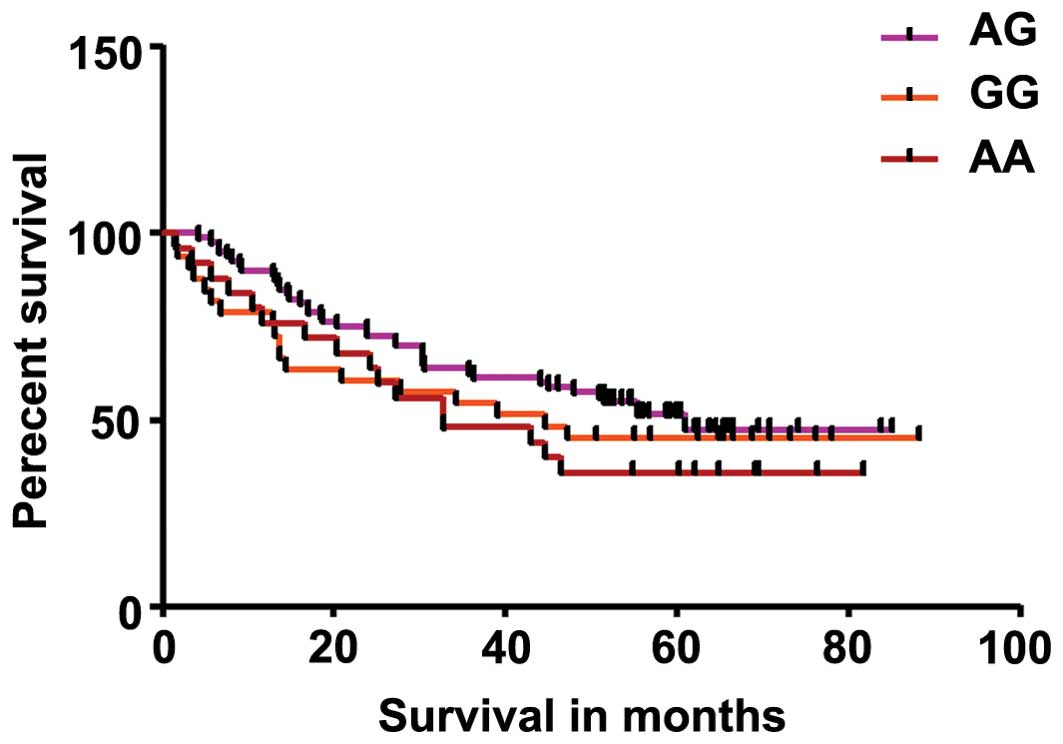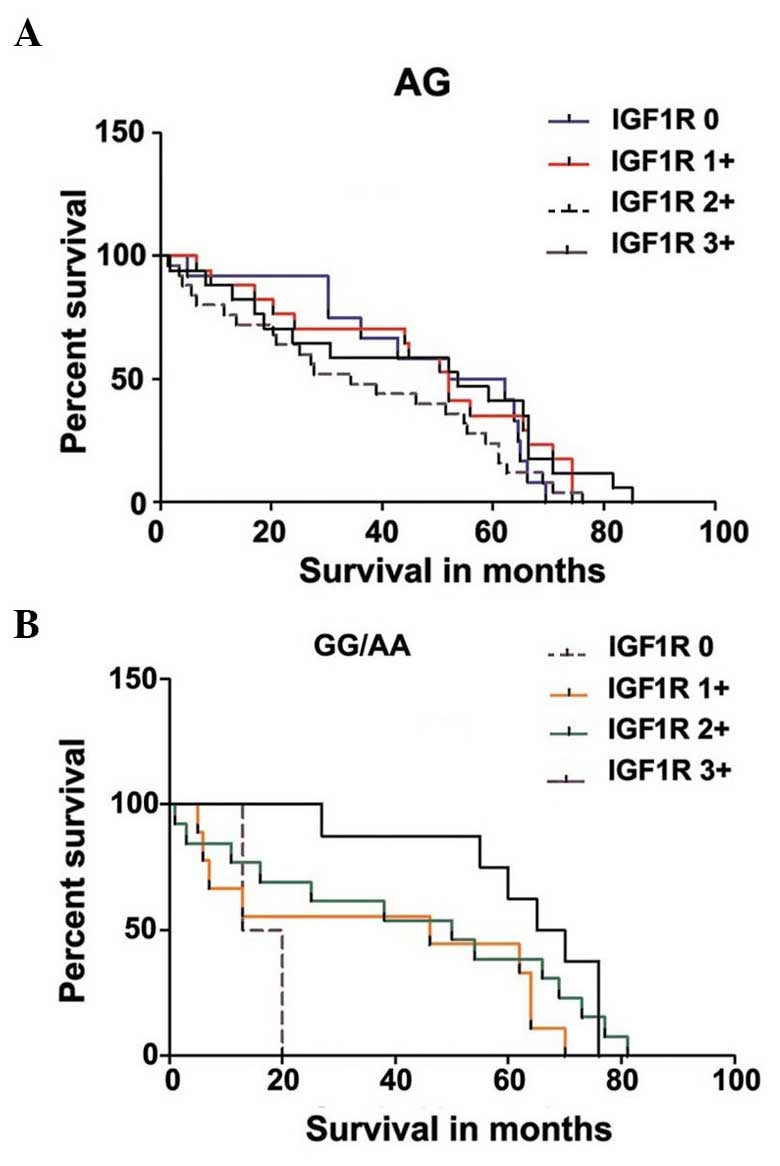|
1
|
Larsson O, Girnita A and Girnita L: Role
of insulin-like growth factor 1 receptor signalling in cancer. Br J
Cancer. 92:2097–2101. 2005. View Article : Google Scholar : PubMed/NCBI
|
|
2
|
Riedemann J and Macaulay VM: IGF1R
signalling and its inhibition. Endocr Relat Cancer. 13:(Suppl 1).
S33–S43. 2006. View Article : Google Scholar : PubMed/NCBI
|
|
3
|
Cappuzzo F, Tallini G, Finocchiaro G,
Wilson RS, Ligorio C, Giordano L, Toschi L, Incarbone M, Cavina R,
Terracciano L, et al: Insulin-like growth factor receptor 1 (IGF1R)
expression and survival in surgically resected non-small-cell lung
cancer (NSCLC) patients. Ann Oncol. 21:562–567. 2010. View Article : Google Scholar : PubMed/NCBI
|
|
4
|
Lee CY, Jeon JH, Kim HJ, Shin DH, Roh TW,
Ahn CM and Chang YS: Clinical significance of insulin-like growth
factor-1 receptor expression in stage I non-small-cell lung cancer:
Immunohistochemical analysis. Korean J Intern Med. 23:116–120.
2008. View Article : Google Scholar : PubMed/NCBI
|
|
5
|
Li R, Pourpak A and Morris SW: Inhibition
of the insulin-like growth factor-1 receptor (IGF1R) tyrosine
kinase as a novel cancer therapy approach. J Med Chem.
52:4981–5004. 2009. View Article : Google Scholar : PubMed/NCBI
|
|
6
|
Rochester MA, Riedemann J, Hellawell GO,
Brewster SF and Macaulay VM: Silencing of the IGF1R gene enhances
sensitivity to DNA-damaging agents in both PTEN wild-type and
mutant human prostate cancer. Cancer Gene Ther. 12:90–100. 2005.
View Article : Google Scholar : PubMed/NCBI
|
|
7
|
Gong Y, Yao E, Shen R, Goel A, Arcila M,
Teruya-Feldstein J, Zakowski MF, Frankel S, Peifer M, Thomas RK, et
al: High expression levels of total IGF-1R and sensitivity of NSCLC
cells in vitro to an anti-IGF-1R antibody (R1507). PLoS One.
4:e72732009. View Article : Google Scholar : PubMed/NCBI
|
|
8
|
Vanamala J, Reddivari L, Radhakrishnan S
and Tarver C: Resveratrol suppresses IGF-1 induced human colon
cancer cell proliferation and elevates apoptosis via suppression of
IGF-1R/Wnt and activation of p53 signaling pathways. BMC Cancer.
10:2382010. View Article : Google Scholar : PubMed/NCBI
|
|
9
|
Hellawell GO, Turner GD, Davies DR,
Poulsom R, Brewster SF and Macaulay VM: Expression of the type 1
insulin-like growth factor receptor is up-regulated in primary
prostate cancer and commonly persists in metastatic disease. Cancer
Res. 62:2942–2950. 2002.PubMed/NCBI
|
|
10
|
Samani AA, Yakar S, LeRoith D and Brodt P:
The role of the IGF system in cancer growth and metastasis:
Overview and recent insights. Endocr Rev. 28:20–47. 2007.
View Article : Google Scholar : PubMed/NCBI
|
|
11
|
Yamamoto T, Oshima T, Yoshihara K, Nishi
T, Arai H, Inui K, Kaneko T, Nozawa A, Adachi H, Rino Y, et al:
Clinical significance of immunohistochemical expression of
insulin-like growth factor-1 receptor and matrix
metalloproteinase-7 in resected non-small cell lung cancer. Exp
Ther Med. 3:797–802. 2012.PubMed/NCBI
|
|
12
|
Nakagawa M, Uramoto H, Oka S, Chikaishi Y,
Iwanami T, Shimokawa H, So T, Hanagiri T and Tanaka F: Clinical
significance of IGF1R expression in non-small-cell lung cancer.
Clin Lung Cancer. 13:136–142. 2012. View Article : Google Scholar : PubMed/NCBI
|
|
13
|
Zhao S, Qiu Z, He J, Li L and Li W:
Insulin-like growth factor receptor 1 (IGF1R) expression and
survival in non-small cell lung cancer patients: A meta-analysis.
Int J Clin Exp Pathol. 7:6694–6704. 2014.PubMed/NCBI
|
|
14
|
Ludovini V, Bellezza G, Pistola L,
Bianconi F, Di Carlo L, Sidoni A, Semeraro A, Del Sordo R,
Tofanetti FR, Mameli MG, et al: High coexpression of both
insulin-like growth factor receptor-1 (IGFR-1) and epidermal growth
factor receptor (EGFR) is associated with shorter disease-free
survival in resected non-small-cell lung cancer patients. Ann
Oncol. 20:842–849. 2009. View Article : Google Scholar : PubMed/NCBI
|
|
15
|
Gately K, Forde L, Cuffe S, Cummins R, Kay
EW, Feuerhake F and O'Byrne KJ: High coexpression of both EGFR and
IGF1R correlates with poor patient prognosis in resected
non-small-cell lung cancer. Clin Lung Cancer. 15:58–66. 2014.
View Article : Google Scholar : PubMed/NCBI
|
|
16
|
Langer CJ, Novello S, Park K, Krzakowski
M, Karp DD, Mok T, Benner RJ, Scranton JR, Olszanski AJ and Jassem
J: Randomized, phase III trial of first-line figitumumab in
combination with paclitaxel and carboplatin versus paclitaxel and
carboplatin alone in patients with advanced non-small-cell lung
cancer. J Clin Oncol. 32:2059–2066. 2014. View Article : Google Scholar : PubMed/NCBI
|
|
17
|
Eberhard DA, Johnson BE, Amler LC, Goddard
AD, Heldens SL, Herbst RS, Ince WL, Jänne PA, Januario T, Johnson
DH, et al: Mutations in the epidermal growth factor receptor and in
KRAS are predictive and prognostic indicators in patients with
non-small-cell lung cancer treated with chemotherapy alone and in
combination with erlotinib. J Clin Oncol. 23:5900–5909. 2005.
View Article : Google Scholar : PubMed/NCBI
|
|
18
|
Lynch TJ, Bell DW, Sordella R,
Gurubhagavatula S, Okimoto RA, Brannigan BW, Harris PL, Haserlat
SM, Supko JG, Haluska FG, et al: Activating mutations in the
epidermal growth factor receptor underlying responsiveness of
non-small-cell lung cancer to gefitinib. N Engl J Med.
350:2129–2139. 2004. View Article : Google Scholar : PubMed/NCBI
|
|
19
|
Paez JG, Jänne PA, Lee JC, Tracy S,
Greulich H, Gabriel S, Herman P, Kaye FJ, Lindeman N, Boggon TJ, et
al: EGFR mutations in lung cancer: Correlation with clinical
response to gefitinib therapy. Science. 304:1497–1500. 2004.
View Article : Google Scholar : PubMed/NCBI
|
|
20
|
Gazdar AF, Shigematsu H, Herz J and Minna
JD: Mutations and addiction to EGFR: The Achilles ‘heal’ of lung
cancers? Trends Mol Med. 10:481–486. 2004. View Article : Google Scholar : PubMed/NCBI
|
|
21
|
Weinstein IB, Joe A and Felsher D:
Oncogene addiction. Cancer Res. 68:3077–3080. 2008. View Article : Google Scholar : PubMed/NCBI
|
|
22
|
Al-Zahrani A, Sandhu MS, Luben RN,
Thompson D, Baynes C, Pooley KA, Luccarini C, Munday H, Perkins B,
Smith P, et al: IGF1 and IGFBP3 tagging polymorphisms are
associated with circulating levels of IGF1, IGFBP3 and risk of
breast cancer. Hum Mol Genet. 15:1–10. 2006. View Article : Google Scholar : PubMed/NCBI
|
|
23
|
Feik E, Baierl A, Hieger B, Führlinger G,
Pentz A, Stättner S, Weiss W, Pulgram T, Leeb G, Mach K, et al:
Association of IGF1 and IGFBP3 polymorphisms with colorectal polyps
and colorectal cancer risk. Cancer Causes Control. 21:91–97. 2010.
View Article : Google Scholar : PubMed/NCBI
|
|
24
|
Verheus M, McKay JD, Kaaks R, Canzian F,
Biessy C, Johansson M, Grobbee DE, Peeters PH and van Gils CH:
Common genetic variation in the IGF-1 gene, serum IGF-I levels and
breast density. Breast Cancer Res Treat. 112:109–122. 2008.
View Article : Google Scholar : PubMed/NCBI
|
|
25
|
Lönn S, Rothman N, Shapiro WR, Fine HA,
Selker RG, Black PM, Loeffler JS, Hutchinson AA and Inskip PD:
Genetic variation in insulin-like growth factors and brain tumor
risk. Neuro Oncol. 10:553–559. 2008. View Article : Google Scholar : PubMed/NCBI
|
|
26
|
de Alencar SA and Lopes JCD: A
comprehensive in silico analysis of the functional and structural
impact of SNPs in the IGF1R gene. J Biomed Biotechnol.
2010:7151392010. View Article : Google Scholar : PubMed/NCBI
|
|
27
|
MacDonald K, Porter GA, Guernsey DL, Zhao
R and Casson AG: A polymorphic variant of the insulin-like growth
factor type I receptor gene modifies risk of obesity for esophageal
adenocarcinoma. Cancer Epidemiol. 33:37–40. 2009. View Article : Google Scholar : PubMed/NCBI
|
|
28
|
Li HR, Chen YS, Shao H, Han LL and Zhang
XE: Association between polymorphisms of insulin-like growth factor
receptor gene and susceptibility to non-small-cell lung cancer in
Fujian Chinese. Zhonghua Yi Xue Yi Chuan Xue Za Zhi. 29:300–305.
2012.(In Chinese). PubMed/NCBI
|
|
29
|
Chen Y, Shao H, Li H, Han L and Zhang X:
Relationship of insulin-like growth factor receptor single
nucleotide polymorphism (SNP) with platinum-based chemotherapy
outcomes in advanced non-small cell lung cancer. Zhongguo Fei Ai Za
Zhi. 15:65–71. 2012.(In Chinese). PubMed/NCBI
|
|
30
|
Winder T, Zhang W, Yang D, Ning Y, Bohanes
P, Gerger A, Wilson PM, Pohl A, Mauro DJ, Langer C, et al: Germline
polymorphisms in genes involved in the IGF1 pathway predict
efficacy of cetuximab in wild-type KRAS mCRC patients. Clin Cancer
Res. 16:5591–5602. 2010. View Article : Google Scholar : PubMed/NCBI
|
|
31
|
Deming SL, Ren Z, Wen W, Shu XO, Cai Q,
Gao YT and Zheng W: Genetic variation in IGF1, IGF-1R, IGFALS, and
IGFBP3 in breast cancer survival among Chinese women: A report from
the Shanghai Breast Cancer Study. Breast Cancer Res Treat.
104:309–319. 2007. View Article : Google Scholar : PubMed/NCBI
|
|
32
|
Reinmuth N, Kloos S, Warth A, Risch A,
Muley T, Hoffmann H, Thomas M and Meister M: Insulin-like growth
factor 1 pathway mutations and protein expression in resected
non-small cell lung cancer. Hum Pathol. 45:1162–1168. 2014.
View Article : Google Scholar : PubMed/NCBI
|
|
33
|
Mountain CF: The international system for
staging lung cancer. Semin Surg Oncol. 18:106–115. 2000. View Article : Google Scholar : PubMed/NCBI
|
|
34
|
Purcell SM, Wray NR, Stone JL, Visscher
PM, O'Donovan MC, Sullivan PF and Sklar P: International
Schizophrenia Consortium: Common polygenic variation contributes to
risk of schizophrenia and bipolar disorder. Nature. 460:748–752.
2009.PubMed/NCBI
|
|
35
|
Kim JG, Kang MJ, Yoon YK, Kim HP, Park J,
Song SH, Han SW, Park JW, Kang GH, Kang KW, et al:
Heterodimerization of glycosylated insulin-like growth factor-1
receptors and insulin receptors in cancer cells sensitive to
anti-IGF1R antibody. PLoS One. 7:e333222012. View Article : Google Scholar : PubMed/NCBI
|
|
36
|
Kim WY, Prudkin L, Feng L, Kim ES,
Hennessy B, Lee JS, Lee JJ, Glisson B, Lippman SM, Wistuba II, et
al: Epidermal growth factor receptor and K-Ras mutations and
resistance of lung cancer to insulin-like growth factor 1 receptor
tyrosine kinase inhibitors. Cancer. 118:3993–4003. 2012. View Article : Google Scholar : PubMed/NCBI
|
|
37
|
Hunt R, Sauna ZE, Ambudkar SV, Gottesman
MM and Kimchi-Sarfaty C: Silent (synonymous) SNPs: Should we care
about them? Methods Mol Biol. 578:23–39. 2009. View Article : Google Scholar : PubMed/NCBI
|
|
38
|
Cheng J, Liu J, Li X, Peng J, Han S, Zhang
R, Xu Y and Nie S: Insulin-like growth factor-1 receptor
polymorphism and ischemic stroke: A case-control study in Chinese
population. Acta Neurol Scand. 118:333–338. 2008.PubMed/NCBI
|
|
39
|
Bonafè M, Barbieri M, Marchegiani F,
Olivieri F, Ragno E, Giampieri C, Mugianesi E, Centurelli M,
Franceschi C and Paolisso G: Polymorphic variants of insulin-like
growth factor I (IGF-I) receptor and phosphoinositide 3-kinase
genes affect IGF-I plasma levels and human longevity: Cues for an
evolutionarily conserved mechanism of life span control. J Clin
Endocrinol Metab. 88:3299–3304. 2003. View Article : Google Scholar : PubMed/NCBI
|
|
40
|
Diorio C, Brisson J, Bérubé S and Pollak
M: Genetic polymorphisms involved in insulin-like growth factor
(IGF) pathway in relation to mammographic breast density and IGF
levels. Cancer Epidemiol Biomarkers Prev. 17:880–888. 2008.
View Article : Google Scholar : PubMed/NCBI
|
|
41
|
Rasmussen SK, Lautier C, Hansen L, Echwald
SM, Hansen T, Ekstrøm CT, Urhammer SA, Borch-Johnsen K, Grigorescu
F, Smith RJ, et al: Studies of the variability of the genes
encoding the insulin-like growth factor I receptor and its ligand
in relation to type 2 diabetes mellitus. J Clin Endocrinol Metab.
85:1606–1610. 2000. View Article : Google Scholar : PubMed/NCBI
|

















